Mentoring: Exploring Background, Theories, and Reflective Viewpoints
VerifiedAdded on 2020/01/21
|7
|1776
|312
Report
AI Summary
This report delves into the multifaceted world of mentoring, commencing with a comprehensive introduction that establishes the essence of mentoring as a developmental relationship focused on career objectives. The report then provides a historical context of mentoring, highlighting its significance and benefits in the workplace, emphasizing the role of experienced employees guiding junior staff. The report explores the social exchange theory as a framework for understanding mentoring dynamics, examining the exchange of behaviors, costs, and rewards within the mentor-mentee relationship. Furthermore, the report offers a reflective perspective, analyzing mentoring from the mentor's viewpoint, emphasizing the importance of interpersonal skills, creating a supportive environment, and the challenges faced by mentors. The report evaluates and critiques relevant literature from a reflective standpoint, underscoring the importance of strong and friendly relationships in the workplace, and providing advice for overcoming challenges. The report concludes by summarizing the key takeaways, emphasizing the rewarding nature of mentoring for career development and the benefits it offers to both individuals and organizations.

Reflective
Paraphrase This Document
Need a fresh take? Get an instant paraphrase of this document with our AI Paraphraser

TABLE OF CONTENTS
Introduction......................................................................................................................................3
Conclusion ......................................................................................................................................6
References .......................................................................................................................................7
2
Introduction......................................................................................................................................3
Conclusion ......................................................................................................................................6
References .......................................................................................................................................7
2
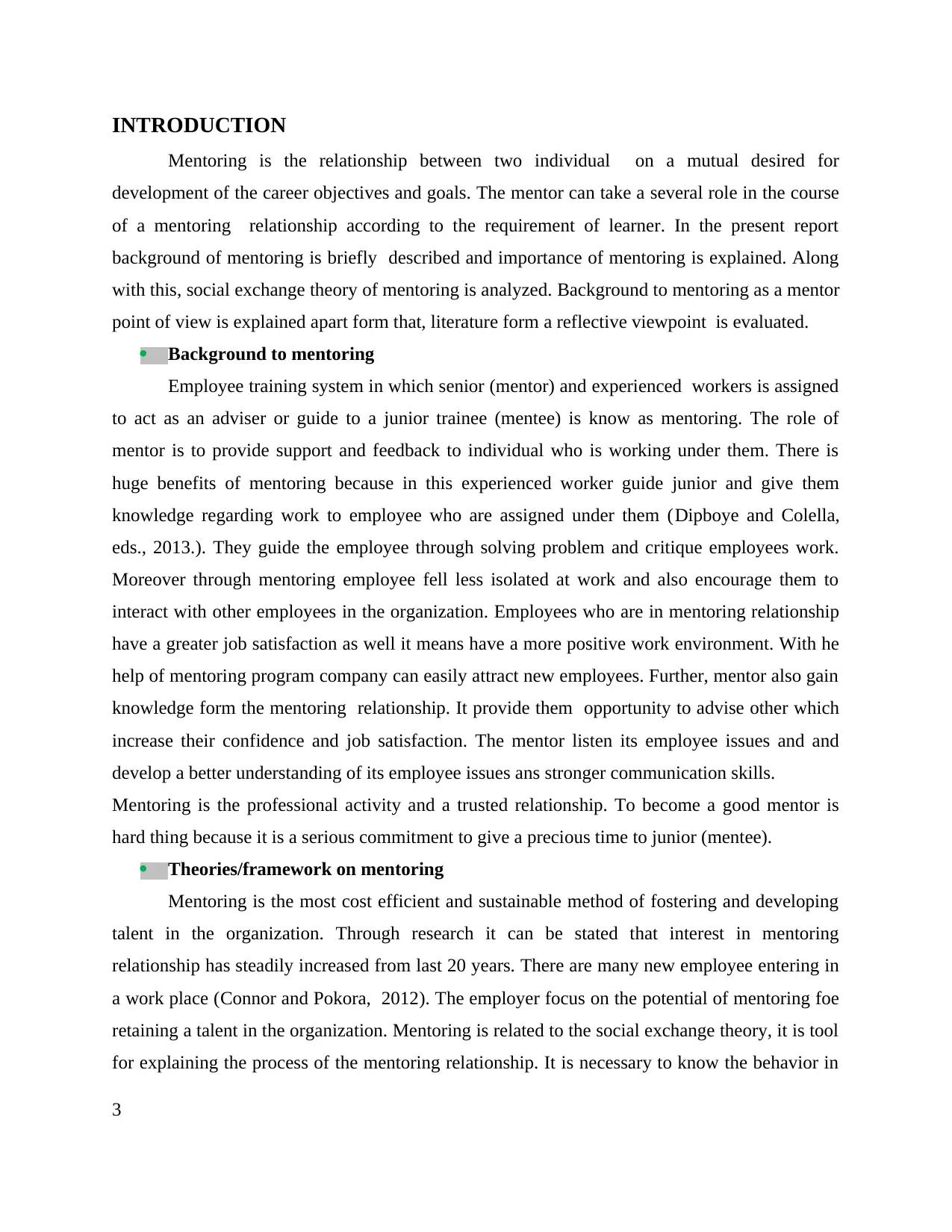
INTRODUCTION
Mentoring is the relationship between two individual on a mutual desired for
development of the career objectives and goals. The mentor can take a several role in the course
of a mentoring relationship according to the requirement of learner. In the present report
background of mentoring is briefly described and importance of mentoring is explained. Along
with this, social exchange theory of mentoring is analyzed. Background to mentoring as a mentor
point of view is explained apart form that, literature form a reflective viewpoint is evaluated.
Background to mentoring
Employee training system in which senior (mentor) and experienced workers is assigned
to act as an adviser or guide to a junior trainee (mentee) is know as mentoring. The role of
mentor is to provide support and feedback to individual who is working under them. There is
huge benefits of mentoring because in this experienced worker guide junior and give them
knowledge regarding work to employee who are assigned under them (Dipboye and Colella,
eds., 2013.). They guide the employee through solving problem and critique employees work.
Moreover through mentoring employee fell less isolated at work and also encourage them to
interact with other employees in the organization. Employees who are in mentoring relationship
have a greater job satisfaction as well it means have a more positive work environment. With he
help of mentoring program company can easily attract new employees. Further, mentor also gain
knowledge form the mentoring relationship. It provide them opportunity to advise other which
increase their confidence and job satisfaction. The mentor listen its employee issues and and
develop a better understanding of its employee issues ans stronger communication skills.
Mentoring is the professional activity and a trusted relationship. To become a good mentor is
hard thing because it is a serious commitment to give a precious time to junior (mentee).
Theories/framework on mentoring
Mentoring is the most cost efficient and sustainable method of fostering and developing
talent in the organization. Through research it can be stated that interest in mentoring
relationship has steadily increased from last 20 years. There are many new employee entering in
a work place (Connor and Pokora, 2012). The employer focus on the potential of mentoring foe
retaining a talent in the organization. Mentoring is related to the social exchange theory, it is tool
for explaining the process of the mentoring relationship. It is necessary to know the behavior in
3
Mentoring is the relationship between two individual on a mutual desired for
development of the career objectives and goals. The mentor can take a several role in the course
of a mentoring relationship according to the requirement of learner. In the present report
background of mentoring is briefly described and importance of mentoring is explained. Along
with this, social exchange theory of mentoring is analyzed. Background to mentoring as a mentor
point of view is explained apart form that, literature form a reflective viewpoint is evaluated.
Background to mentoring
Employee training system in which senior (mentor) and experienced workers is assigned
to act as an adviser or guide to a junior trainee (mentee) is know as mentoring. The role of
mentor is to provide support and feedback to individual who is working under them. There is
huge benefits of mentoring because in this experienced worker guide junior and give them
knowledge regarding work to employee who are assigned under them (Dipboye and Colella,
eds., 2013.). They guide the employee through solving problem and critique employees work.
Moreover through mentoring employee fell less isolated at work and also encourage them to
interact with other employees in the organization. Employees who are in mentoring relationship
have a greater job satisfaction as well it means have a more positive work environment. With he
help of mentoring program company can easily attract new employees. Further, mentor also gain
knowledge form the mentoring relationship. It provide them opportunity to advise other which
increase their confidence and job satisfaction. The mentor listen its employee issues and and
develop a better understanding of its employee issues ans stronger communication skills.
Mentoring is the professional activity and a trusted relationship. To become a good mentor is
hard thing because it is a serious commitment to give a precious time to junior (mentee).
Theories/framework on mentoring
Mentoring is the most cost efficient and sustainable method of fostering and developing
talent in the organization. Through research it can be stated that interest in mentoring
relationship has steadily increased from last 20 years. There are many new employee entering in
a work place (Connor and Pokora, 2012). The employer focus on the potential of mentoring foe
retaining a talent in the organization. Mentoring is related to the social exchange theory, it is tool
for explaining the process of the mentoring relationship. It is necessary to know the behavior in
3
⊘ This is a preview!⊘
Do you want full access?
Subscribe today to unlock all pages.

Trusted by 1+ million students worldwide
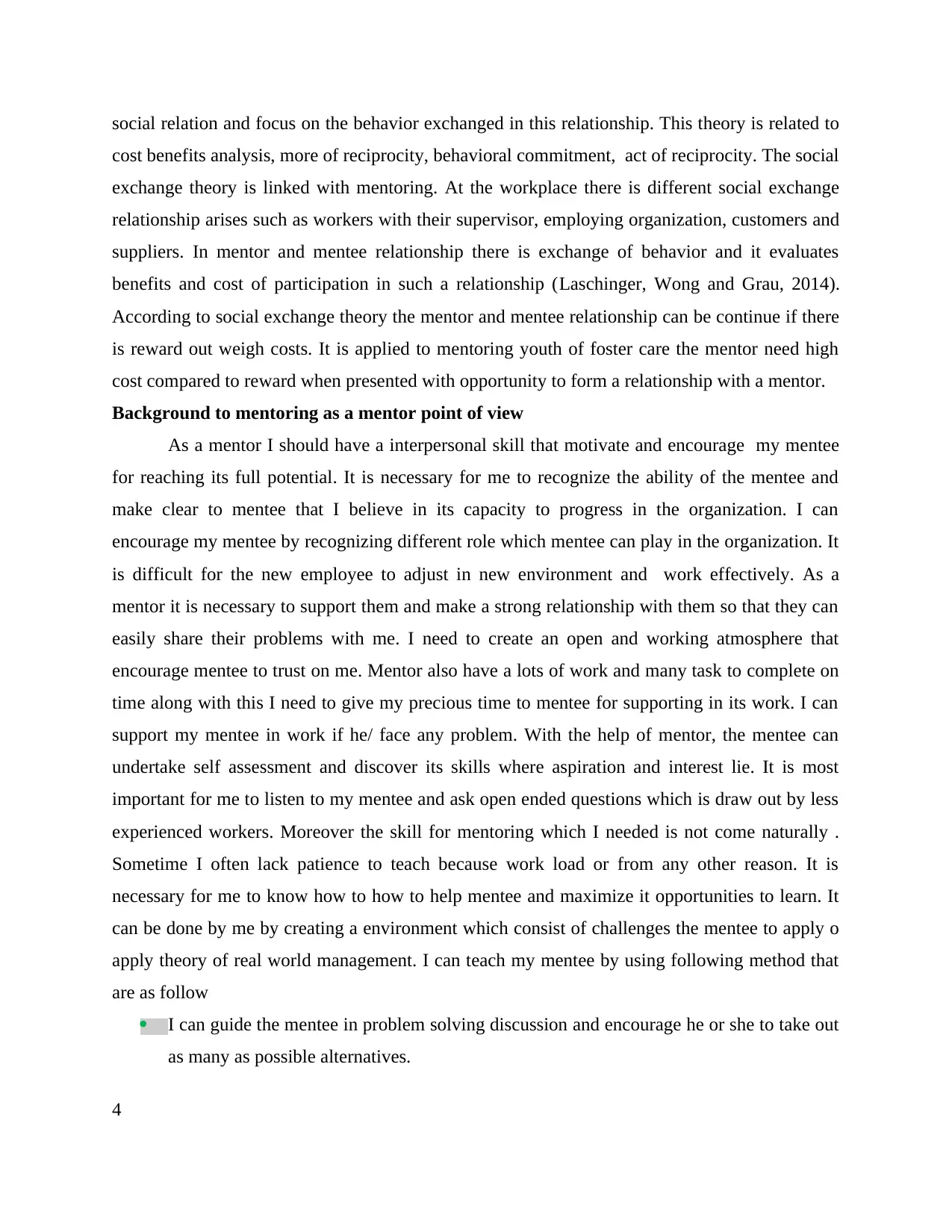
social relation and focus on the behavior exchanged in this relationship. This theory is related to
cost benefits analysis, more of reciprocity, behavioral commitment, act of reciprocity. The social
exchange theory is linked with mentoring. At the workplace there is different social exchange
relationship arises such as workers with their supervisor, employing organization, customers and
suppliers. In mentor and mentee relationship there is exchange of behavior and it evaluates
benefits and cost of participation in such a relationship (Laschinger, Wong and Grau, 2014).
According to social exchange theory the mentor and mentee relationship can be continue if there
is reward out weigh costs. It is applied to mentoring youth of foster care the mentor need high
cost compared to reward when presented with opportunity to form a relationship with a mentor.
Background to mentoring as a mentor point of view
As a mentor I should have a interpersonal skill that motivate and encourage my mentee
for reaching its full potential. It is necessary for me to recognize the ability of the mentee and
make clear to mentee that I believe in its capacity to progress in the organization. I can
encourage my mentee by recognizing different role which mentee can play in the organization. It
is difficult for the new employee to adjust in new environment and work effectively. As a
mentor it is necessary to support them and make a strong relationship with them so that they can
easily share their problems with me. I need to create an open and working atmosphere that
encourage mentee to trust on me. Mentor also have a lots of work and many task to complete on
time along with this I need to give my precious time to mentee for supporting in its work. I can
support my mentee in work if he/ face any problem. With the help of mentor, the mentee can
undertake self assessment and discover its skills where aspiration and interest lie. It is most
important for me to listen to my mentee and ask open ended questions which is draw out by less
experienced workers. Moreover the skill for mentoring which I needed is not come naturally .
Sometime I often lack patience to teach because work load or from any other reason. It is
necessary for me to know how to how to help mentee and maximize it opportunities to learn. It
can be done by me by creating a environment which consist of challenges the mentee to apply o
apply theory of real world management. I can teach my mentee by using following method that
are as follow
I can guide the mentee in problem solving discussion and encourage he or she to take out
as many as possible alternatives.
4
cost benefits analysis, more of reciprocity, behavioral commitment, act of reciprocity. The social
exchange theory is linked with mentoring. At the workplace there is different social exchange
relationship arises such as workers with their supervisor, employing organization, customers and
suppliers. In mentor and mentee relationship there is exchange of behavior and it evaluates
benefits and cost of participation in such a relationship (Laschinger, Wong and Grau, 2014).
According to social exchange theory the mentor and mentee relationship can be continue if there
is reward out weigh costs. It is applied to mentoring youth of foster care the mentor need high
cost compared to reward when presented with opportunity to form a relationship with a mentor.
Background to mentoring as a mentor point of view
As a mentor I should have a interpersonal skill that motivate and encourage my mentee
for reaching its full potential. It is necessary for me to recognize the ability of the mentee and
make clear to mentee that I believe in its capacity to progress in the organization. I can
encourage my mentee by recognizing different role which mentee can play in the organization. It
is difficult for the new employee to adjust in new environment and work effectively. As a
mentor it is necessary to support them and make a strong relationship with them so that they can
easily share their problems with me. I need to create an open and working atmosphere that
encourage mentee to trust on me. Mentor also have a lots of work and many task to complete on
time along with this I need to give my precious time to mentee for supporting in its work. I can
support my mentee in work if he/ face any problem. With the help of mentor, the mentee can
undertake self assessment and discover its skills where aspiration and interest lie. It is most
important for me to listen to my mentee and ask open ended questions which is draw out by less
experienced workers. Moreover the skill for mentoring which I needed is not come naturally .
Sometime I often lack patience to teach because work load or from any other reason. It is
necessary for me to know how to how to help mentee and maximize it opportunities to learn. It
can be done by me by creating a environment which consist of challenges the mentee to apply o
apply theory of real world management. I can teach my mentee by using following method that
are as follow
I can guide the mentee in problem solving discussion and encourage he or she to take out
as many as possible alternatives.
4
Paraphrase This Document
Need a fresh take? Get an instant paraphrase of this document with our AI Paraphraser
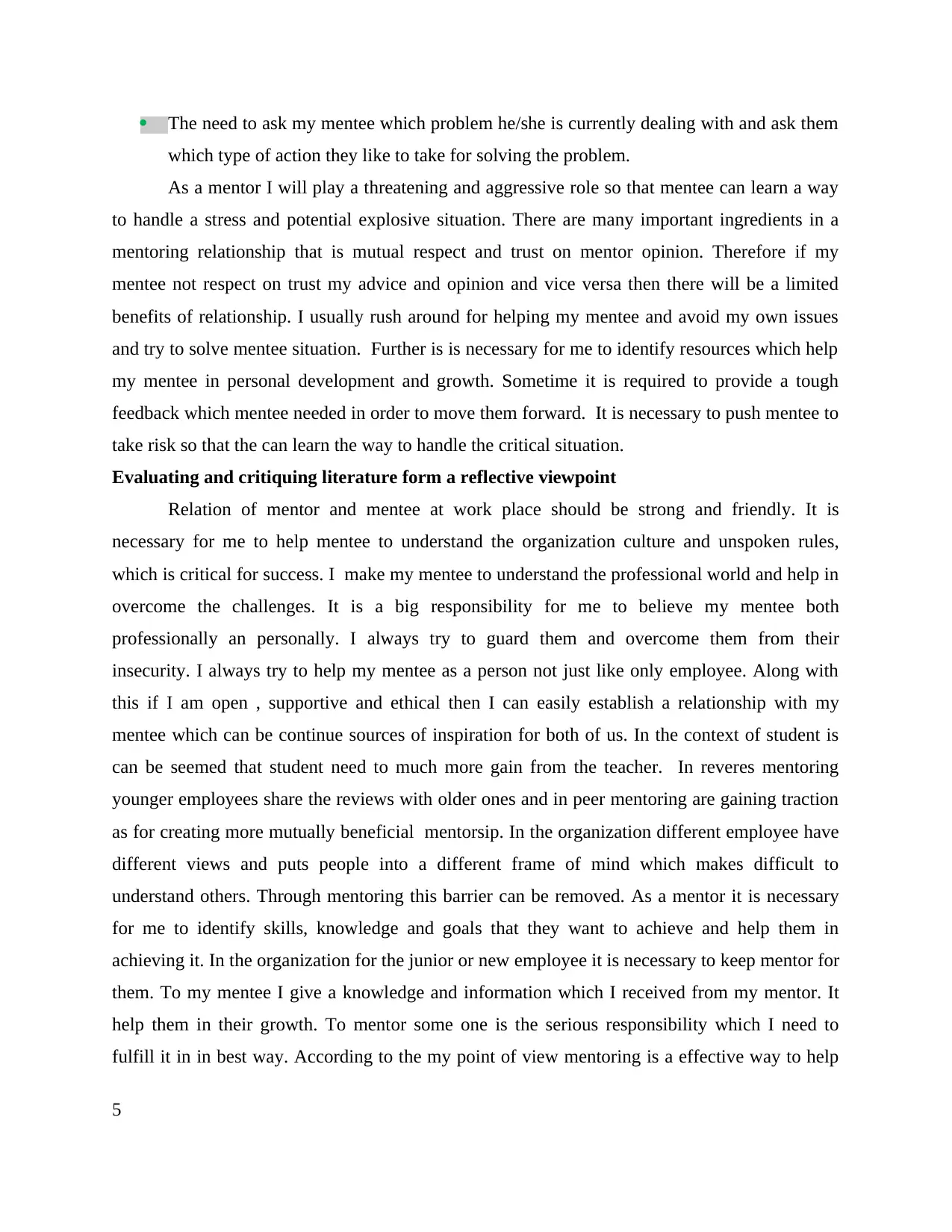
The need to ask my mentee which problem he/she is currently dealing with and ask them
which type of action they like to take for solving the problem.
As a mentor I will play a threatening and aggressive role so that mentee can learn a way
to handle a stress and potential explosive situation. There are many important ingredients in a
mentoring relationship that is mutual respect and trust on mentor opinion. Therefore if my
mentee not respect on trust my advice and opinion and vice versa then there will be a limited
benefits of relationship. I usually rush around for helping my mentee and avoid my own issues
and try to solve mentee situation. Further is is necessary for me to identify resources which help
my mentee in personal development and growth. Sometime it is required to provide a tough
feedback which mentee needed in order to move them forward. It is necessary to push mentee to
take risk so that the can learn the way to handle the critical situation.
Evaluating and critiquing literature form a reflective viewpoint
Relation of mentor and mentee at work place should be strong and friendly. It is
necessary for me to help mentee to understand the organization culture and unspoken rules,
which is critical for success. I make my mentee to understand the professional world and help in
overcome the challenges. It is a big responsibility for me to believe my mentee both
professionally an personally. I always try to guard them and overcome them from their
insecurity. I always try to help my mentee as a person not just like only employee. Along with
this if I am open , supportive and ethical then I can easily establish a relationship with my
mentee which can be continue sources of inspiration for both of us. In the context of student is
can be seemed that student need to much more gain from the teacher. In reveres mentoring
younger employees share the reviews with older ones and in peer mentoring are gaining traction
as for creating more mutually beneficial mentorsip. In the organization different employee have
different views and puts people into a different frame of mind which makes difficult to
understand others. Through mentoring this barrier can be removed. As a mentor it is necessary
for me to identify skills, knowledge and goals that they want to achieve and help them in
achieving it. In the organization for the junior or new employee it is necessary to keep mentor for
them. To my mentee I give a knowledge and information which I received from my mentor. It
help them in their growth. To mentor some one is the serious responsibility which I need to
fulfill it in in best way. According to the my point of view mentoring is a effective way to help
5
which type of action they like to take for solving the problem.
As a mentor I will play a threatening and aggressive role so that mentee can learn a way
to handle a stress and potential explosive situation. There are many important ingredients in a
mentoring relationship that is mutual respect and trust on mentor opinion. Therefore if my
mentee not respect on trust my advice and opinion and vice versa then there will be a limited
benefits of relationship. I usually rush around for helping my mentee and avoid my own issues
and try to solve mentee situation. Further is is necessary for me to identify resources which help
my mentee in personal development and growth. Sometime it is required to provide a tough
feedback which mentee needed in order to move them forward. It is necessary to push mentee to
take risk so that the can learn the way to handle the critical situation.
Evaluating and critiquing literature form a reflective viewpoint
Relation of mentor and mentee at work place should be strong and friendly. It is
necessary for me to help mentee to understand the organization culture and unspoken rules,
which is critical for success. I make my mentee to understand the professional world and help in
overcome the challenges. It is a big responsibility for me to believe my mentee both
professionally an personally. I always try to guard them and overcome them from their
insecurity. I always try to help my mentee as a person not just like only employee. Along with
this if I am open , supportive and ethical then I can easily establish a relationship with my
mentee which can be continue sources of inspiration for both of us. In the context of student is
can be seemed that student need to much more gain from the teacher. In reveres mentoring
younger employees share the reviews with older ones and in peer mentoring are gaining traction
as for creating more mutually beneficial mentorsip. In the organization different employee have
different views and puts people into a different frame of mind which makes difficult to
understand others. Through mentoring this barrier can be removed. As a mentor it is necessary
for me to identify skills, knowledge and goals that they want to achieve and help them in
achieving it. In the organization for the junior or new employee it is necessary to keep mentor for
them. To my mentee I give a knowledge and information which I received from my mentor. It
help them in their growth. To mentor some one is the serious responsibility which I need to
fulfill it in in best way. According to the my point of view mentoring is a effective way to help
5
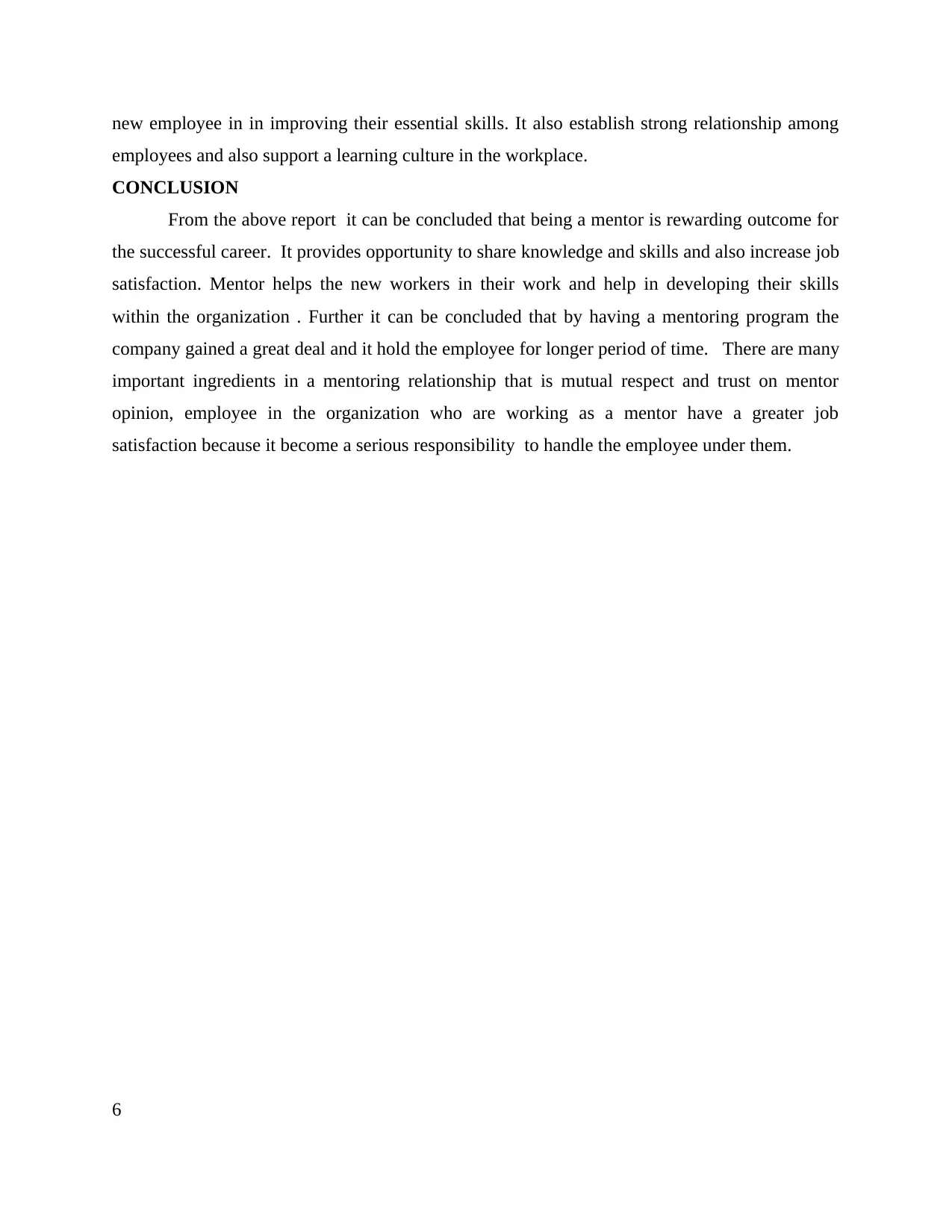
new employee in in improving their essential skills. It also establish strong relationship among
employees and also support a learning culture in the workplace.
CONCLUSION
From the above report it can be concluded that being a mentor is rewarding outcome for
the successful career. It provides opportunity to share knowledge and skills and also increase job
satisfaction. Mentor helps the new workers in their work and help in developing their skills
within the organization . Further it can be concluded that by having a mentoring program the
company gained a great deal and it hold the employee for longer period of time. There are many
important ingredients in a mentoring relationship that is mutual respect and trust on mentor
opinion, employee in the organization who are working as a mentor have a greater job
satisfaction because it become a serious responsibility to handle the employee under them.
6
employees and also support a learning culture in the workplace.
CONCLUSION
From the above report it can be concluded that being a mentor is rewarding outcome for
the successful career. It provides opportunity to share knowledge and skills and also increase job
satisfaction. Mentor helps the new workers in their work and help in developing their skills
within the organization . Further it can be concluded that by having a mentoring program the
company gained a great deal and it hold the employee for longer period of time. There are many
important ingredients in a mentoring relationship that is mutual respect and trust on mentor
opinion, employee in the organization who are working as a mentor have a greater job
satisfaction because it become a serious responsibility to handle the employee under them.
6
⊘ This is a preview!⊘
Do you want full access?
Subscribe today to unlock all pages.

Trusted by 1+ million students worldwide
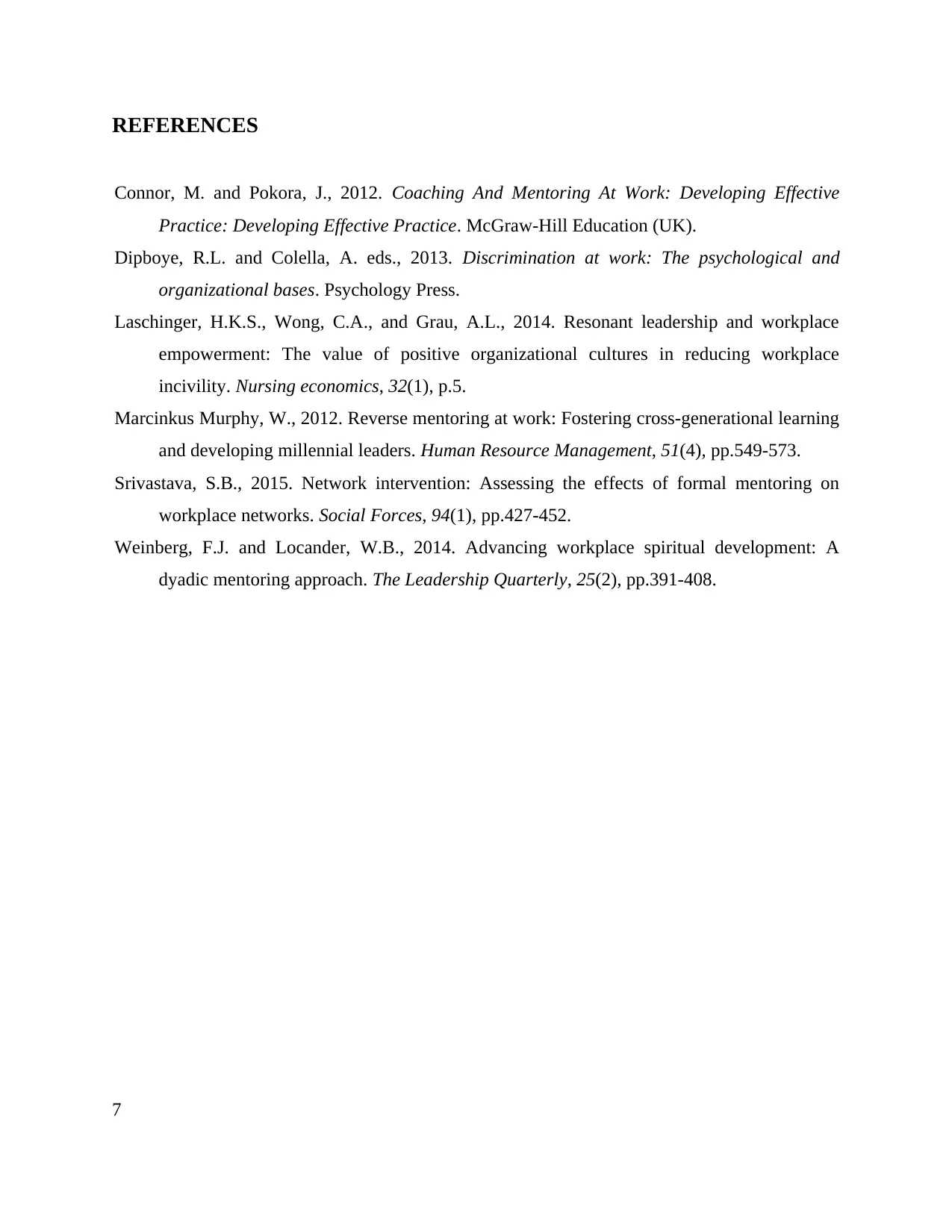
REFERENCES
Connor, M. and Pokora, J., 2012. Coaching And Mentoring At Work: Developing Effective
Practice: Developing Effective Practice. McGraw-Hill Education (UK).
Dipboye, R.L. and Colella, A. eds., 2013. Discrimination at work: The psychological and
organizational bases. Psychology Press.
Laschinger, H.K.S., Wong, C.A., and Grau, A.L., 2014. Resonant leadership and workplace
empowerment: The value of positive organizational cultures in reducing workplace
incivility. Nursing economics, 32(1), p.5.
Marcinkus Murphy, W., 2012. Reverse mentoring at work: Fostering cross‐generational learning
and developing millennial leaders. Human Resource Management, 51(4), pp.549-573.
Srivastava, S.B., 2015. Network intervention: Assessing the effects of formal mentoring on
workplace networks. Social Forces, 94(1), pp.427-452.
Weinberg, F.J. and Locander, W.B., 2014. Advancing workplace spiritual development: A
dyadic mentoring approach. The Leadership Quarterly, 25(2), pp.391-408.
7
Connor, M. and Pokora, J., 2012. Coaching And Mentoring At Work: Developing Effective
Practice: Developing Effective Practice. McGraw-Hill Education (UK).
Dipboye, R.L. and Colella, A. eds., 2013. Discrimination at work: The psychological and
organizational bases. Psychology Press.
Laschinger, H.K.S., Wong, C.A., and Grau, A.L., 2014. Resonant leadership and workplace
empowerment: The value of positive organizational cultures in reducing workplace
incivility. Nursing economics, 32(1), p.5.
Marcinkus Murphy, W., 2012. Reverse mentoring at work: Fostering cross‐generational learning
and developing millennial leaders. Human Resource Management, 51(4), pp.549-573.
Srivastava, S.B., 2015. Network intervention: Assessing the effects of formal mentoring on
workplace networks. Social Forces, 94(1), pp.427-452.
Weinberg, F.J. and Locander, W.B., 2014. Advancing workplace spiritual development: A
dyadic mentoring approach. The Leadership Quarterly, 25(2), pp.391-408.
7
1 out of 7
Related Documents
Your All-in-One AI-Powered Toolkit for Academic Success.
+13062052269
info@desklib.com
Available 24*7 on WhatsApp / Email
![[object Object]](/_next/static/media/star-bottom.7253800d.svg)
Unlock your academic potential
Copyright © 2020–2026 A2Z Services. All Rights Reserved. Developed and managed by ZUCOL.





